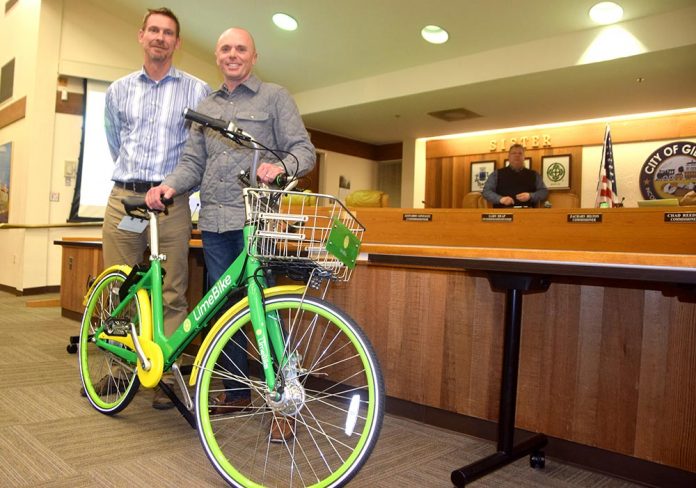Gilroy’s plan to introduce Lime, a bike-share service, has popped a tire.
On a conference call Monday with the city, the San Mateo-based company announced it has reconsidered its launch of sharable bicycles, and will instead focus on electric scooters and bikes in larger cities.
In January the Gilroy Bicycle and Pedestrian Commision approved a plan for Lime to unveil 200 to 300 dockless, sharable bikes. The city council approved the plan in March, and it appeared that Lime had the green light. The lime-green bikes were expected to hit the streets within a month.
Things changed this week. Lime will not be riding into Gilroy.
Citing a rapidly evolving market, Lime representative Sam Dreiman told Bicycle and Pedestrian Commissioner Zach Hilton and City Engineer Gary Heap that the company is phasing out its pedal bikes and will instead focus on its electric products.
Dreiman said Lime did not have the supply to meet the expected demand in Gilroy. Lime will instead focus on markets like Los Angeles, Miami, Atlanta and San Diego, among other larger cities.
“Even if we did have electric scooters, and that would be a stronger case for me to make, it is difficult because we need to have a certain population density to grow,” Dreiman said.
While the door for Lime has not closed indefinitely, the city council did not factor in electric scooters when they approved the contract with Lime. The city will also need to decide if it wants electronic bikes.
“Even though I am disappointed, our commision will still continue to advocate and pursue all means of alternative transportation for the city,” Hilton said.
In the spring electric scooters from several companies descended on the sidewalks and streets of San Francisco like a swarm of clumsy locusts. Riders barreling down sidewalks created a nuisance, and in May the city ordered the scooters—including Lime’s—off the streets and sidewalks until the companies receive permits.
Growing pains aside, bike shares provide a useful alternative for traffic-choked cities. Mass transit riders often use bike shares to get to and from the train or bus. The bikes and electric scooters produce no emissions and pull cars off the road, and the pedal versions give the rider some exercise.
They are also hard to regulate for bike-share companies, and it has been a challenge for them to keep riders off sidewalks and to make sure they wear helmets.
“It’s such a young transportation mode, and we have some catching up to do to educate users not to use sidewalks,” Drieman said.
Lime is not the only player in the bike-share market. Companies like Ofo and Bird are already established. In San Jose, Lime competes for space with Ford’s GoBike program, and other major automobile companies like Hyundai and Toyota have unveiled electric scooters of their own. Uber and Lyft, pioneers in the rideshare economy, which has torpedoed the taxi industry, are also seeking to get in on bike sharing.
Lime drops plans for Gilroy
BIKE-SHARE COMPANY FOCUS NOW IN BIG CITIES














